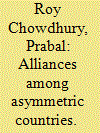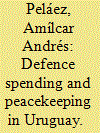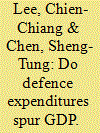|
|
|
Sort Order |
|
|
|
Items / Page
|
|
|
|
|
|
|
| Srl | Item |
| 1 |
ID:
076956


|
|
|
|
|
| Publication |
2007.
|
| Summary/Abstract |
We examine alliances between asymmetric countries. We find that the results depend on the nature of the equilibrium. If the equilibrium is an interior one then, with an increase in asymmetry, the level of the alliance-wide defense good decreases and the divergence between the first best and the equilibrium level of the defense good increases. In the case where the equilibrium involves a corner solution, these results are reversed. It may be argued, however, that the interior equilibrium case is the more relevant one.
|
|
|
|
|
|
|
|
|
|
|
|
|
|
|
|
| 2 |
ID:
076958


|
|
|
|
|
| Publication |
2007.
|
| Summary/Abstract |
Uruguay is a country with a very unusual profile, since it has just 3.4 million inhabitants but is among the top ten troop contributors to the UN PKO (Peace Keeping Operations) and is the first contributor per capita. In 2002 and 2003 it was the seventh troop contributor to the UN, and by the end of 2005 it was eighth in the UN ranking. Uruguay has never had any imminent external threat to its security after its independence in 1828, and it has had no internal threat since the end of the urban guerrillas' actions in the 1970s. The country has no defence industry, and has always had an all-volunteer military service, which presently involves almost 1% of the total population, and about 2% of the labour force. The empirical evidence presented in this paper shows that, in the past decades, Uruguayan defence spending has been influenced mainly by internal factors, most of them of an economic nature. The high participation in PKO has not increased military expenditure and it has produced a positive impact on the country's economy
|
|
|
|
|
|
|
|
|
|
|
|
|
|
|
|
| 3 |
ID:
076953


|
|
|
|
|
| Publication |
2007.
|
| Summary/Abstract |
This paper models the determination of the defence industrial base - the number of different military systems a country decides to maintain. High R&D costs means that few countries can afford to produce major weapons systems and the producers also import systems. Non-producers rely on imports and we assume their demand is driven by regional arms races. Military capability is determined by the number of systems and the quantity and quality of each. We examine how the defence industrial base is influenced by military expenditures, R&D costs, export controls, the nature of regional arms races and a variety of other factors.
|
|
|
|
|
|
|
|
|
|
|
|
|
|
|
|
| 4 |
ID:
076957


|
|
|
|
|
| Publication |
2007.
|
| Summary/Abstract |
This paper empirically re-examines the long-run co-movements and the causal relationships between GDP and defence expenditures in a multivariate model with real defence expenditure per capita (ME), real GDP per capita (GDP), and real capital stock per capita (K). We apply the view of the aggregate production function to construct the empirical model. Using up-to-date data for 27 OECD countries and 62 non-OECD countries for the 1988-2003 period, we combine cross-sectional and time series data to re-investigate the relationship between GDP and ME. Previous studies using time series data may have yielded misleading results on account of the short time span of typical datasets. By contrast, we use recently developed panel unit root tests and heterogeneous panel cointegration tests, and conclude that there is fairly strong evidence in favour of the hypothesis of a long-run equilibrium relationship between GDP and ME. The long-run panel regression parameter results, such as the fully modified OLS, indicate that a positive relationship between GDP and ME only holds for OECD countries, whereas a negative relationship from ME to GDP only exists in non-OECD countries under examination and in the panel as a whole. Furthermore, by implementing the dynamic panel-based error correction model, we determine that GDP and ME lack short-run causalities, but do show long-run bidirectional causalities in both OECD and non-OECD countries
|
|
|
|
|
|
|
|
|
|
|
|
|
|
|
|
| 5 |
ID:
076954


|
|
|
|
|
| Publication |
2007.
|
| Summary/Abstract |
Urban sprawl has led to increasing prevalence of endangered species on military training facilities throughout the United States. Provisions of the Endangered Species Act imply encroachment interrupts military training activities and may affect military readiness. Endangered species protection and military training are competing non-market goods. This paper reports the estimates of public valuation of military training activities incorporating explicit trade-offs associated with endangered species protection. Our results suggest the public is willing to pay to alleviate conflicts between endangered species and the military. The public values for continued survival of endangered species approximately equal those for military readiness
|
|
|
|
|
|
|
|
|
|
|
|
|
|
|
|
| 6 |
ID:
076955


|
|
|
|
|
| Publication |
2007.
|
| Summary/Abstract |
Famous cultural monuments are often regarded as unique icons, making them an attractive target for terrorists. Despite huge military and police outlays, terrorist attacks on important monuments can hardly be avoided. We argue that an effective strategy to discourage terrorist attacks on iconic monuments is for a government to show a firm commitment to swift reconstruction. Using a simple game-theoretic model, we demonstrate how a credible claim to rebuild any destroyed cultural monument discourages terrorist attacks by altering the terrorists' expectations and by increasing the government's reputation costs if they fail to rebuild
|
|
|
|
|
|
|
|
|
|
|
|
|
|
|
|
| 7 |
ID:
018235


|
|
|
|
|
| Publication |
Nov 2000.
|
| Description |
373-406
|
| Summary/Abstract |
China will join the WTO soon. This article does not question the rationale of China's decision to join the WTO; nor does it challenge the premise that, all in all, the potential benefits from WTO membership outweigh the potential costs, at least in the long term. Rather, it focuses on the social and political implications of China's WTO membership. It is assumed that even if WTO membership is potentially a productivity-enhancing move for China, the benefits and costs of such a change will not be evenly distributed. Unless there is a mechanism that can induce or force the winners to compensate the losers, distributive conflicts between the two groups will be inevitable. Such conflicts may weaken or even erode political support for globalization. Thus, to remain committed to globalization, the government of an open economy must play a role in redistributing gains and costs. The first section elaborates this analytical framework. The second section argues that Chinese reforms have changed from a win–win game to a zero-sum game. As a result, China has turned itself from a relatively egalitarian society into one with huge and growing inequalities. The third section analyzes who will stand to win and lose when China joins the WTO. It predicts that precisely those social groups who have borne the costs of recent reforms will be hit hardest. More significantly, those losers happen to be the social groups that have long served as the political bases of the communist regime. WTO membership thus poses a challenge to the legitimacy of the Chinese government. The final section discusses the political implications of China's WTO membership.
|
|
|
|
|
|
|
|
|
|
|
|
|
|
|
|
|
|
|
|
|